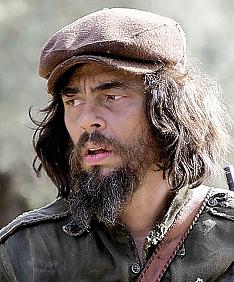
It's not quite out yet and when it is you'll have to pay two admissions to see the four and a half hour extravaganza of Che Guevara's revolutionary struggles, which I sat through last night with a preview audience.
Based on two literary works by Ernesto Che Guevara, Che Part One, with a screenplay by Peter Buchman, and Che Part Two's script by Buchman and Benjamin A. Van Der Veen are filled to the brim with the tales of two revolutions. The first derived from Guevara's Reminiscences of the Cuban Revolutionary War takes us on a journey of Guevara's involvement with Fidel Castro from the mid-fifties when they met in Mexico to the armed struggle to liberate Cuba from dictator Fulgencio Batista in 1959. The second comes from Guevara's The Bolivian Diary after he left Cuba to foment rebellion in Africa and finally Bolivia.
To the writers' credit, the biopics deliver a lot of history without overwhelming us with a bunch of speeches that encapsulate Guevara's life. This was the main criticism I found in Milk, wherein it seemed almost every word out of his mouth was another platitude related to the slain San Francisco Supervisor's life cause. Don't get me wrong, there's plenty of dogma emitted in Che, but it's interspersed more effectively with the media coverage of the time. It is spoon-fed in a more credible manner and we believe it as dialogue rather than sound bites.
Che Part One is told in flashback as the late ABC TV Reporter Lisa Howard, played by Julia Ormond, interviews Guevara, who is in New York City to address the United Nations. Throughout the exchange we are shown in cutaways how the Cuban cause progressed from preliminary conversations to the heavy fighting in the wooded terrain of Cuba.
The film is directed and photographed by Steven Soderbergh in a sweeping manner, with taut stirring music by Alberto Iglesias, beautifully underplaying Soderbergh's cinematography achievements (which are credited to Peter Andrews his longtime alias). The action moves forth in a very realistic manner, sometimes plodding along as there's a bit too much unnecessary depiction of the battle sequences. We meet different people en route and, while factually correct, most are not known to the vast public and it might have been wise to cut down on the number of skirmishes in which the rebels were engaged.
Benicio Del Toro is magnetic and haunting as Che, but he has the difficult task of communicating to us through subtitles, as most of the film is told in Spanish. It lends an authentic ring to the story, but distracts our attention somewhat in the manner of Mel Gibson's The Passion of the Christ. If a film is truly a foreign film it's one thing, but this is a huge motion picture starring an American actor and directed by an American, and there's no reason why this story couldn't have been told in English. Other important films this year set in foreign locales have been, such as The Reader and Defiance, which I've earlier reviewed, not to mention classics like Spartacus and Judgment at Nuremberg. I'm not saying it's a huge drawback, but it slows down the action and you sometimes miss things when you're constantly bobbing your head trying to see what the players are saying.
Che Part Two, essentially by the same team, follows Che several years later after he left Cuba under a mysterious cloud and engaged in revolutionary activities elsewhere. We pick him up entering Bolivia under an assumed name with a phony passport and watch him motivate at first unwilling Bolivian nationals to accept a foreigner's command and take on an oppressive dictatorship.
As the films will be released separately it might be unfair to judge them having sat through both of them right after one another. Those who actually attend might just see one and, in any case, won't be burdened with the sameness of the two in rapid succession as I was.
However, it brought to bear the likeness inherent. On the one hand was my fascination with what was going on in the political times and the depths to which the filmmakers brought it to the screen. On the other I looked at my watch having seen similar scenes of battle one after the other. Plus, the lack of suspense for those who are familiar with the historical events made me pine for something I didn't know. Perhaps some more personal stories or interaction with Guevara's family, from which he was separated for such long periods.
As a dramatization of important events, the complexity and breadth of parts one and two of Che are more significant than Milk or Frost/Nixon. However, the simplicity of the latter two are ultimately more satisfying as they engage us much more greatly on an emotional level.
For this reason I'm not sure either segment of Che will find a huge audience, but for those who are interested in this part of recent world history and how it affected our nation, not to mention the larger than life charisma of Che Guevara, there is much that will please.
Michael Russnow's website is www.ramproductionsinternational.com.

